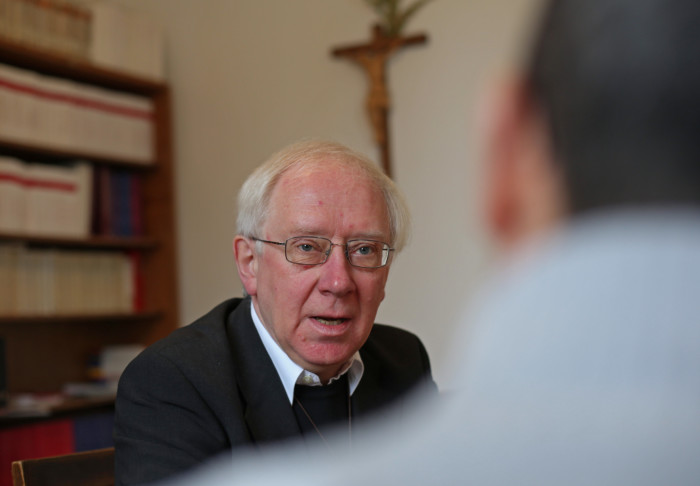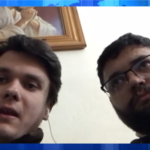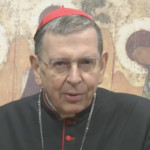At the end of his term, Fr. Heinz Lau looks back on his years of service as provincial of the German province.
He does not like to be classified as “conservative” or “progressive,” but, “I try to be credible in what I say, think, and do. One must be consistent.” This is what the Priests of Sacred Heart Father Heinz Lau SCJ says.
He has been in charge of the German religious province of the Priests of the Sacred Heart since October 2015. The General Government in Rome appointed Father, then 65, as provincial. He succeeded Fr. Heiner Wilmer SCJ, elected Superior General of the Order in May 2015 and consecrated Bishop of Hildesheim in September 2018 after a short term. On July 1, 2019, Fr. Lau was reappointed Provincial of the German Province for three years, and on June 1 he will be succeeded by Fr. Stefan Tertünte SCJ.
In this interview, the 71-year-old reviews the past years:
Have you enjoyed being Provincial?
Overall, yes. I have been co-responsible for the guidelines and development of our Province, and I like taking responsibility. But unfortunately, in the last two years I have had little presence because of the Pandemic. This has made my task more difficult. However, I have always tried to maintain contact with my confreres. And we managed to advance the development of our houses. They are all up to standard and well located.
Do you still remember your goals and plans when you took office?
I became provincial superior by surprise-almost overnight. There was not much time to become one. But I had and have goals: We Priests of the Sacred Heart want to work in a Church that is in step with the times, that is not outdated and habitual, with communities that are like spiritual centers. We must never forget which side we are on: on the side of ordinary people, and especially social Catholicism is very important to me. I want us to keep Dehonian spirituality alive and spread it.
What is this Dehonian spirituality?
It is centrally biblical! We are oriented by the attitude of Jesus Christ. This is the way I read the Bible and spread it: that we adopt the attitude of Jesus for our lives. For me it is important that mysticism and politics go hand in hand, not side by side! This means: I bring the world into prayer, and through prayer my actions change.
How would you sum up the development of the last few years?
Overall, together with the excellent Provincial Council, we have managed to accomplish a lot. Our four communities in Neustadt, Martental, Freiburg and Handrup are well positioned, and we are also maintaining the small houses in Berlin and Oberhausen. We have invested a lot of time, strength and energy in centralization: the communications office, the donations office, the accounting office, and the Missions Office are located in Neustadt, and the provincial economic manager works closely with these offices. This was an important and right step.
Unfortunately, dear brothers and comrades have passed away in recent years, and the responsibility is now spread over fewer shoulders.
And: I have always tried to maintain good contacts with other entities in the congregation. This works especially well with Brazil, Cameroon, Poland, and Madagascar, and also with Luxembourg.

How do you see the German Dehonian Province today?
I think overall we are in a pretty good situation. Our perception is positive, especially thanks to some confreres who are working and working very well. All our houses have great charism, religious celebrations are well attended everywhere. We also want to give a different face to the church: not an old-fashioned, sterile and boring church, but an open and perhaps even provocative one.
A group from the Priests of the Sacred Heart has developed a vision for the province, which was confirmed at the last provincial assembly. What do you think are the central elements of this vision?
It is important that we follow the spirit of our founder, Father Leo Dehon. I think overall we are very open to people, able to relate and try to live his mission, “Go to the people!” We have a spiritual influence that has a very positive effect. This is also a legacy of Father Dehon, who said we should not go around like owls. And we are not meant for the sacristy and funerals. We are an apostolic religious community in the midst of a secular world.
You talk about positive charism and spirituality, communities as spiritual centers and a secular world. At the same time, more and more Catholics are turning their backs on their church. What can the Priests of the Sacred Heart do to counter this phenomenon?
Yes, unfortunately all of this exists: sexism, clericalism, hierarchies, and exclusion. The fact that the wind is blowing in our face as the Catholic Church is something we have brought upon ourselves over the centuries. We have ruined even precious sacraments like confession by controlling the faithful and investigating their lives.
I oppose this with an inner renewal. I greatly value spiritual life, but even this has been too little considered in the Church! Many of us Priests of the Sacred Heart offer people spiritual accompaniment, retreats – and we are hospitable: how else could we get in touch with people?
What have been the “milestones” for you in these almost seven years of provincial mandate?
It is crucial that we progress well together everywhere. I can quote something in this regard from each of our houses: I am happy that Freiburg is an international house of studies, that it is hospitable to students from other provinces. It is a spiritual house, we offer accompaniment and confession talks there, and we have an eye for the social problems of the city.
As for Neustadt, I am very happy that centralization has worked so well. The development of an open educational facility and guest house has been so successful that I would never have imagined it.
Martental has always been a popular place of pilgrimage. The services are still very well attended and you always meet people who go there to pray. The monastery also comes across as very open and hospitable.
Our school in Handrup is very much appreciated! Even though we are a confessional gymnasium and are located in a remote rural area, we have a huge popularity.
What my confrere Ernst-Otto Sloot does in Oberhausen as a religious teacher in a huge vocational school deserves the utmost respect. As for Berlin, I am still convinced of the importance of our presence in a big city. All our offers are well received.
Also, we are very well disposed to our employees.
Finally, the question: you have been willingly provincial. Were you also glad to leave office?
Yes, I am 71 years old, and I have also been rector at Handrup for six months, after the sudden death of Fr. August Hülsmann. This school requires a lot: construction work that has not yet been completed and the digitization of teaching are two key aspects. Now I am happy to be in Handrup and I believe I am handing over a well settled province to my confrere Stefan Tertünte.




